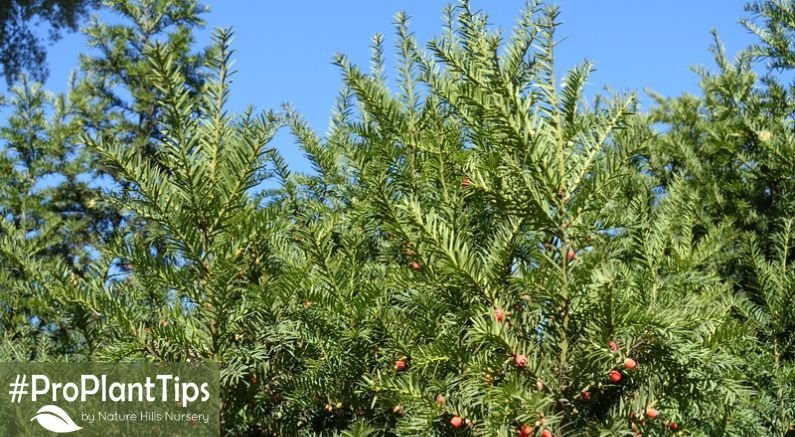Evergreen Yew Landscaping: Privacy, Hedges & Foundations

Fantastic landscape standards, Yew shrubs (Taxus family) are premium evergreen conifers perfect for landscaping, offering year-round greenery, easy maintenance, and exceptional versatility. These drought-tolerant shrubs excel as privacy screens, formal hedges, foundation plants, and topiary specimens while thriving in both full sun and full shade conditions.
Taxus family conifers were described in 1753 by Carolus Linnæus, and the name may have been derived from the Greek word 'toxon', meaning bow or arrow. These plants have flat 'leaves' that spiral around the flexible young stems, and reddish bark. Yews produce berry-like fruit from a scale-like cone on female plants.
Check out this complete guide to Yew bushes to add curb appeal to your landscape here!

All About The Yew Shrub
Yews offer unmatched versatility among evergreens: thriving in full sun to full shade, requiring minimal maintenance once established, and adapting to various soil types with proper drainage. With over 400 cultivars available, these disease-resistant shrubs provide year-round structure, exceptional pruning response, and offer year-round solutions for every landscape need from groundcover to tall privacy screens!
The two main types used for landscaping are the English (European) Yew and the Japanese Yew.
Popular Yew Varieties For Different Landscaping Needs

Plants in the Taxus family are steeped in holiday traditions and strongly associated with churchyards and church graveyards as a symbol of sadness, and as holiday décor!
Best Yews for Privacy Hedges & Screens
- Hicks Yew: Upright columnar growth, perfect for formal hedges and privacy screens, easily maintained at desired height
- Fairview Yew: Natural vase-shaped habit, excellent for informal hedge borders and foundation plantings
- Captain Upright Pyramidal Yew: Naturally pyramidal evergreen ideal for windbreaks and vertical accent plantings
Foundation Planting & Groundcover Yews

- Densiformis Yew: Compact, dense growth perfect for foundation borders without blocking windows
- Spreading English Yew: Excellent ground cover for large areas, effective erosion control on slopes
- Taunton Spreading Yew: Low-growing, spreading habit ideal for small spaces and foundation plantings
- Wardi Yew: Versatile for slopes, mass plantings, and low-maintenance ground cover applications
Specialty & Warm Climate Alternatives
- Yewtopia Plum Yew: Heat-tolerant alternative for zones 6-9, thrives in humidity
- Japanese Plum Yew: Mid-sized evergreen perfect for hedging in warmer climates (zones 6-9)
- Shrubby Yew Podocarpus: Tall, narrow privacy shrub for zones 7-11
Complete Yew Planting & Care Guide
Site Requirements: Excellent drainage is essential - Yews tolerate clay, loam, or sandy soils but fail in waterlogged conditions. In poor drainage areas, create raised beds with 18+ inches of amended topsoil. Plant in full sun to full shade (in hot climates) with a slightly alkaline pH preferred.
Planting & Establishment: Plant spring or fall, maintain consistent moisture the first year, then water only during drought. Apply a 3-4 inch organic mulch layer around the root zone, keeping material away from the trunk.
Professional Maintenance:
- Pruning: Prune in early spring before new growth; annual shearing for formal hedges; severe renewal pruning rejuvenates overgrown shrubs
- Fertilization: Balanced evergreen fertilizer annually when spring growth appears
- Winter Protection: Shield from drying winds in harsh climates to prevent winter burn. Water well in the autumn, especially for Yews exposed to drying northern winds. Read more about winter watering here.
Landscape Applications & Design Uses

Formal Elements: Perfect for topiary art, hedge borders, and architectural accents, with columnar varieties providing strong vertical structure
Natural Landscaping: Spreading varieties excel for erosion control on slopes, while dense growth creates bird-friendly and wildlife habitat - red berries attract songbirds, including Thrushes, Waxwings, and Finches
Seasonal Interest: Prized for crafts and holiday décor, including winter wreaths, garlands, holiday outdoor container displays, and Christmas arrangements
Climate Adaptability: Most varieties thrive in USDA zones 4-7, with Hicks Yew extending to zone 8 and warm climate alternatives (Plum Yew varieties) suitable for zones 6-11.
Transform your landscape with these versatile, low-maintenance evergreens that deliver professional results with minimal effort. Yews outperform other conifers with superior shade tolerance, exceptional pruning response, and reliable long-term performance - making them the preferred choice of landscape professionals for privacy screens, foundation plantings, and formal hedges.
Happy Planting!


